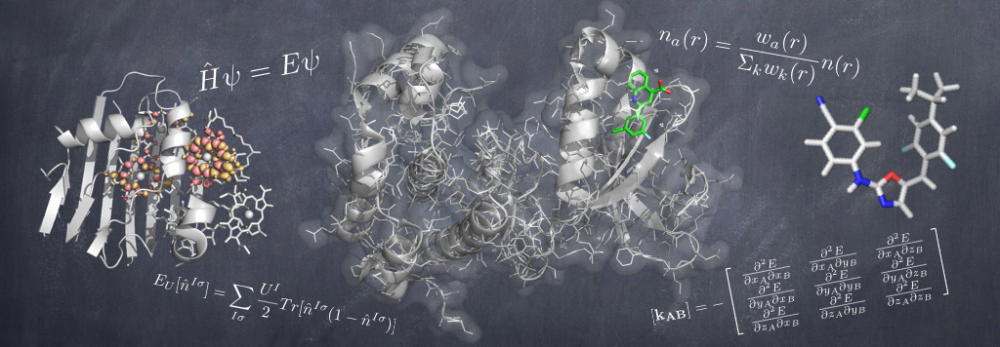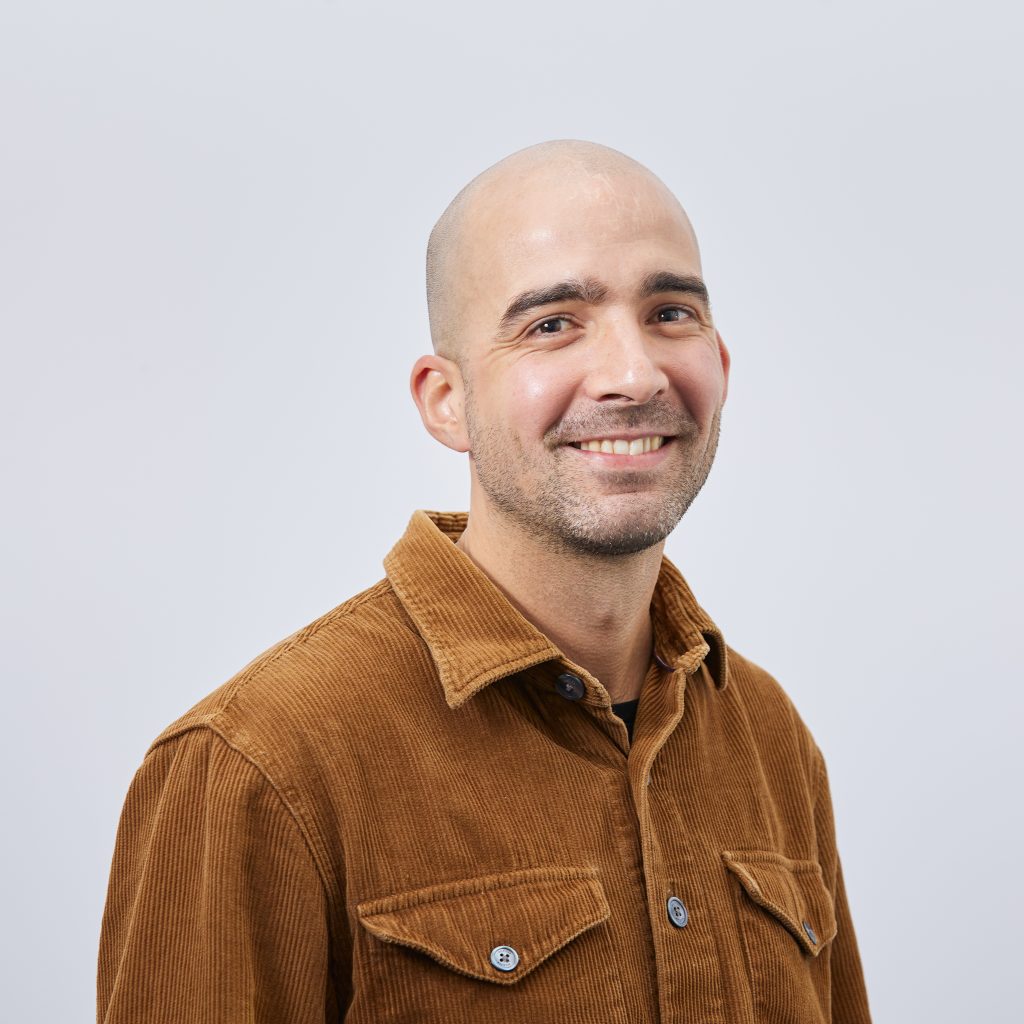We are a computational/theoretical research group located in the Bedson building at Newcastle University. Our research is aimed at the application of computational physics and chemistry to interesting and industrially-relevant questions in the biological and medicinal sciences. Much of our research is aimed at using electronic structure calculations to develop better models for the description of the structure, interactions and dynamics of molecules at the atomistic level, and ultimately for the design of pharmaceutical molecules. We are passionate about open research, and develop open software for force field development and computer-aided drug design.
You can find a few longer posts at our dedicated blog site.
Dr. Daniel Cole
I am a Reader & UKRI Future Leaders Fellow in computational medicinal chemistry in the School of Natural and Environmental Sciences, Newcastle University.
Before taking up my post at Newcastle, I held a Marie Curie international outgoing fellowship, hosted by Prof. William Jorgensen at Yale University and Prof. Mike Payne at the University of Cambridge. I have also previously worked as a research associate at the National University of Singapore and the University of Cambridge.
Academic Roles
- Governing Board Member at the Open Force Field Consortium
- Member of the CCPBioSim Management Group
- Editorial Board of the Living Journal of Computational Molecular Science
Qualifications
- M.Sci. and B.A. in Natural Sciences, University of Cambridge, 2004.
- Ph.D. in Physics, Theory of Condensed Matter group, University of Cambridge, 2008.
Postdoctoral Researchers
Finlay Clark (Ph.D. student, co-supervised with Prof. Julien Michel, 2021-2025; Research Associate, 2025-present). Finlay completed an M.Chem. and doctoral research (principal supervisor Prof. Julien Michel) at the University of Edinburgh. In collaboration with AstraZeneca, he worked on improving the automation, efficiency, and robustness of alchemical absolute binding free energy calculations. Currently, he is working on increasing the accuracy of transferable and system-specific force fields through improved fitting procedures and functional forms, in collaboration with the Open Force Field Initiative. The resulting force fields will be validated with binding free energy calculations and applied in automated workflows for molecular design.
João Morado (Research Associate, 2026-present). João completed his B.Sc. in Biochemistry at the University of Porto, before graduating with a European Master’s degree in Theoretical Chemistry and Computational Modelling from the Autonomous University of Madrid, followed by an M.Sc. in Theoretical and Computational Chemistry from the University of Oxford. He read for a Ph.D. in Theory and Modelling in Chemical Sciences at the University of Southampton, in partnership with Astex and AstraZeneca. He subsequently undertook postdoctoral positions at University College London and the University of Edinburgh, and worked as an RSE at the National Oceanography Centre. His overarching research interests include force field development, machine learning potentials, embedding schemes for multiscale modelling, and biomolecular simulations. Currently, he is working on the development of accurate and efficient methodologies for fitting nonbonded parameters using ab initio reference data surrogates.
PhD Students
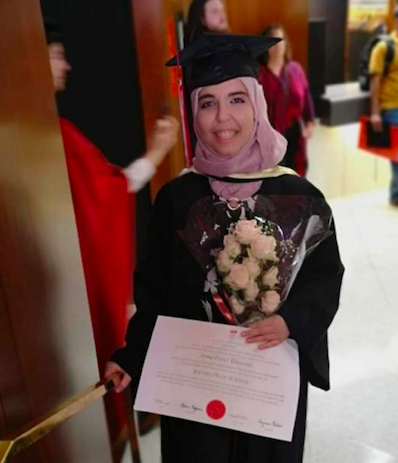
Asma Feriel Khoualdi (Ph.D. student, 2023-present, with Dr Matteo Degiacomi and Prof Wyatt Yue). Asma Feriel completed her B.Sc. in Physiology at McGill University, Canada, before graduating with an M.Sc. in Bioinformatics from the Université de Montréal. Asma Feriel’s most recent thesis project/publication was on the application of atomistics and coarse-grained molecular simulation and docking in the computational prediction of phosphoinositide binding to hyperpolarization-activated cyclic-nucleotide gated (HCN1) channels. Her current research with the Molecular Sciences for Medicine (MoSMed) CDT aims to employ machine learning and knowledge of structure-based drug design towards enhanced understanding of protein dynamics and of flexible, rather than just static, binding pockets.
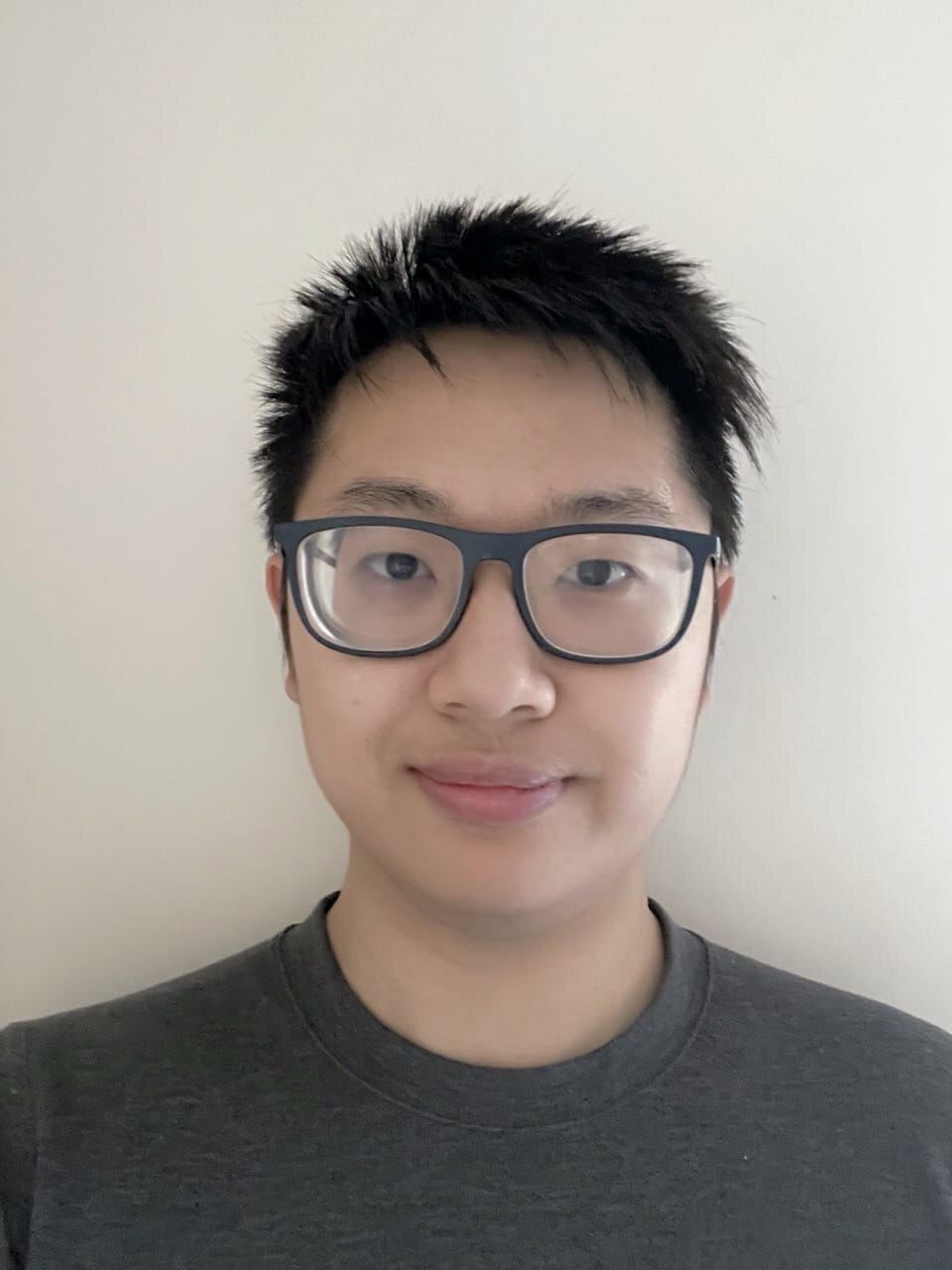
Chi Kit Ng (Ph.D. student, 2024-present, with Dr Jichun Li and Prof Paul Race). Chi Kit completed his M.Sc. in Computer Science with distinction from Newcastle University. His research focuses on employing machine learning and structure-based drug design to gain deeper insights into binding pose prediction and inhibitor design. By improving automated workflows for molecule design and deploying machine learning, Chi Kit aims to enhance the drug discovery process. His most recent publication, “Exploring AI-Driven Drug Repurposing Strategies Targeting ErbB Signalling Pathway for Brain Cancer Therapy”, was on integrating AI and computational methods for drug repurposing.
Alumni

Charlie Adams (Postdoctoral Research Associate, 2023-2025). Charlie completed his M.Eng. in Chemical and Biological Engineering at Sheffield University, with a particular interest in modelling multi-scale processes. His Ph.D. in computational chemistry, in collaboration with Rolls Royce, focused on building a chemical reaction mechanism for the oxidative degradation of jet fuel in the liquid phase. He now joins us as a Knowledge Transfer Partnership Associate, working alongside the AI startup Kuano to utilise deep learning to build state-of-the–art charge models for improved pharmacophore modelling
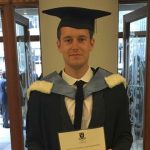
Josh Horton (Ph.D. student, 2016-2019; Postdoctoral Research Associate, 2020-2024). Josh received a BSc in Physics and Mathematics from the University of Liverpool, and completed his Ph.D. at Newcastle University. He worked as a researcher with Lancaster University and the Open Force Field Initiative before returning to Newcastle. His research goal is to improve the accuracy and accessibility of free energy perturbation calculations through the automated re-parameterisation of force fields from high accuracy quantum chemistry calculations that are specific to the system under study.
Mateusz (Mat) Bieniek (Research Software Engineer, 2021-2024) originally studied computer science which is when he became interested in genetics and molecular biology. After working briefly as a Java Developer and undertaking a masters degree in Bioinformatics, Mat decided to focus on molecular dynamics simulations for his Ph.D. at the Francis Crick Institute. His main topic of interest was Fibronectin, the beginnings of fibrillogenesis and how it is related to protein adsorption. During his Ph.D. he also made several contributions to the MDAnalysis package as well as PyMOL as part of the Warren L. DeLano Memorial PyMOL Open-Source Fellowship. After his PhD he joined Peter Coveney’s Computational Chemistry Group at UCL where he worked on the relative binding free energy software TIES, helping to tailor the dual-topology atom mapping among other projects.
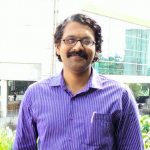
Dr Vadiraj Kurdekar (Postdoctoral Research Associate, 2018-2019). Vadiraj earned his PhD in the field of Medicinal Chemistry from Birla Institute of Technology and Sciences, Pilani, India. Before joining us he worked in the Centre for Chemical Biology and Therapeutics, inStem, India, as Senior Research Scientist in Computational Chemistry, and has contributed to various drug discovery projects focussed on identifying protein-protein interaction inhibitors. His research interests are in the understanding of the role of water molecules in the binding site and the design of novel small molecules that perturb biomolecular interactions.
Josh Littlefair (Ph.D. student, co-supervised with Dr. Tom Penfold, 2016-2021). Josh joined us in October 2016 after graduating with a BSc in Physics with Astrophysics from Northumbria University. His research focuses on the use of molecular mechanics (MM) software to simulate ultrafast X-ray scattering profiles of solutions, on timescales comparable with X-ray free-electron laser (XFEL) measurements.
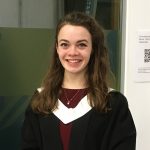
Lauren Nelson (Ph.D. student, 2017-2021). After studying for an MChem in Chemistry for Drug Discovery at the University of Bradford, Lauren pursued an MSc in Chemical Biology and Drug Design at the University of Leeds. Lauren works on testing our new force field protocols in free energy calculations through collaborative projects with the Newcastle University Centre for Cancer and University of Edinburgh.
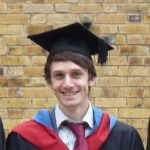
Chris Ringrose (Ph.D. student, 2018-2022). Chris began studying for a BSc in Natural Sciences at the University of Leicester, later transferring to the multi-disciplinary MSci where he specialised in physics. His research focusses on developing our Quantum Mechanical Bespoke Kit (QUBEKit) to improve the accuracy and accessibility of force field design for molecular modelling applications.
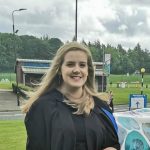
Rachael Pirie (Ph.D. Student, 2019-2023, with Dr Stuart Hall and Dr Matthew Forshaw). Rachael completed her MChem in Chemistry with Computational Chemistry at Heriot-Watt University. Her research aims to develop a new surface-based molecular descriptor for use in virtual screening with machine learning, and to apply this method to projects of interest to the Newcastle University Centre for Cancer.
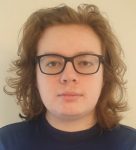
Ben Cree (Ph.D. Student, 2020-2024, with Dr Natalie Tatum and Prof Ehmke Pohl). Ben received his MChem degree from Durham University. During his Masters he explored atomistic and coarse-grained simulations of bent-core liquid crystals. His Ph.D. research with the Molecular Sciences for Medicine (MoSMed) CDT aims to utilise molecular dynamics and structural biology software for drug discovery by creating automated workflows for fragment hit-to-lead optimisation.
Affiliated Members
Finlay Clark (Ph.D. student, co-supervised with Dr Julien Michel, 2021-2025).
Dávid Kovács (Ph.D. student, co-supervised with Prof. Gábor Csányi, 2020-2024).
Edward Linscott (Ph.D. student, co-supervised with Prof. Mike Payne, 2015-2019).
Alice Allen (Ph.D. student, co-supervised with Prof. Mike Payne, 2015-2018).
Lupeng Yang (Ph.D. student, co-supervised with Prof. Mike Payne and Dr. Alex Chin, 2016-present).
